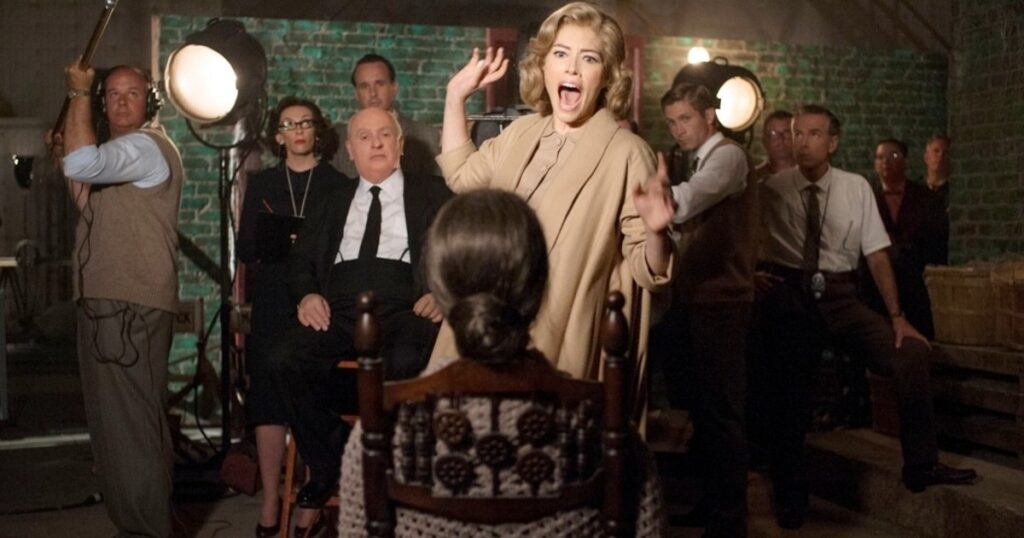May was an unexpectedly great month to watch movies. From the latest — and possibly last — Mission: Impossible sequel to the excellent horror flick Bring Her Back, movie theaters were the place to be last month.
Streaming wasn’t slacking either, with guilty pleasures like Fear Street: Prom Queen and some of 2024’s prestige films like The Brutalist wreaking havoc on my social life.
Netflix’s June programming schedule is just as impressive, with so many films to watch that I had to cancel my wedding.
All joking aside, I have to be selective about what I’m watching, and this week, I picked an underrated 2012 film that no one really talks about today — Hitchcock. Don’t be fooled — this isn’t a routine womb-to-tomb biopic. Instead, it’s a fascinating portrait of an artist at a crossroads and the creation of one of the most influential movies ever made.
A Behind-the-Scenes Look at a Masterpiece
That movie is Psycho, which is so famous, everyone knows what happens in it even if they haven’t seen it. In case you don’t know, here’s a quick plot summary: A woman steals cash from her work, flees to an isolated hotel in the desert, befriends the hotel’s owner, is stabbed to death in the shower and the killer is revealed to be the owner.
Pretty straightforward, right? But in 1960, when sex and violence were strictly prohibited thanks to the Hays Code, this was pretty lurid stuff, and a story like Psycho’s just wasn’t made by mainstream directors. But Alfred Hitchcock (Anthony Hopkins) was always drawn to the macabre, and the film chronicles his growing obsession with adapting the true story of Ed Gein to the big screen.
“Why this one?” his wife Alma (Helen Mirren) asks early in the film. The answer is obvious — the Master of Suspense is bored, and he wants to shake things up a bit. There’s an infectious, rebellious spirit throughout Hitchcock as the great director labors to convince his reluctant staff, skeptical studio executives and nervous actors that Psycho is a movie worth doing.
For every stumble, like Paramount initially refusing to finance the film, there’s a win, like when Hitch cons the censors into thinking he deleted a violence sequence they wanted cut when he actually just re-edited it differently. Even though it takes place when he was 61 and already famous, Hitchcock showcases the director as a maverick willing to bend the rules to realize his artistic vision.
Scenes from a Marriage
Hitchcock isn’t just about the man himself — it’s also about his marriage to Alma. At this point, they’ve been married for over 30 years, and their partnership extended to work as Alma reviewed scripts and contributed valuable notes to some of her husband’s greatest films. In the film, their union is solid, but it’s not perfect, and Alma feels restless with her husband’s total focus on Psycho.
She finds solace with Whitfield Cook (Danny Houston), a writer who urges Alma to strike out on her own. Alma loves her husband, but she’s a little envious of his success and has unrealized ambitions of her own. Hitchcock presents a marriage at a crisis point — what happens when love just isn’t enough anymore? The filmmaker puts up a great front, but when faced with the prospect of losing Alma for good, he’s as scared as the audience members he’s frightened for years.
Stars Playing Stars
Movie biopics like Hitchcock are enjoyable on a superficial level since you get the chance to see modern movie stars playing older ones. That’s certainly the case here, with Jessica Biel playing actress Vera Miles, Ralph Macchio as the film’s writer, Joseph Stefano, and Scarlett Johansson stepping in for Janet Leigh.
It’s the latter who impresses the most, and with good reason — Johansson gets Leigh’s ordinary girl charm just right, and her scenes with Hopkins’ Hitch have a friendly intimacy that comes from two industry pros who know what they’re doing. Johansson’s highest praise, however, came from Leigh’s daughter, Jamie Lee Curtis, who said that a moment in the movie “startles me, where I look at Scarlett and she’s my mother.” Her performance combines uncanny mimicry with real emotion, and it’s one of Johansson’s best roles in her impressive career.
Hitchcock’s ‘Psycho’ — America’s First True Crime Obsession?
It would be enough if Hitchcock were just a biopic about a great movie or a portrait of a vulnerable marriage, but the film is more ambitious than that. It’s also a commentary about America’s obsession with true crime and how Psycho helped give birth to it.
Throughout the film, director Sascha Gervasi intercuts scenes with Ed Gein (Michael Wincott), who is the main inspiration for Norman Bates. This “Ed,” though, isn’t real — he’s a figment of Hitchcock’s imagination and a personification of his fixation on all the lurid deeds the notorious serial killer did in real life.
Are these scenes necessary? Not really. They don’t move the plot forward or give any insight into the actual production of Psycho. But I think they are crucial to what Gervasi is trying to say with this film: that Hitchcock’s obsession is our own, and that’s why Psycho still persists today in the public imagination.
With its scenes of voyeurism and murder and suggestions of necrophilia and incest, Psycho painted an unflattering picture of America at a time when the myth of John F. Kennedy’s Camelot reigned supreme. That’s why it was so disturbing, and why another film — Hitchcock — had to be made to tell us just how revolutionary that picture was — and still is.
But don’t take my word for it. Stream Hitchcock now on Netflix — just make sure you don’t go anywhere near a shower afterward.
Read the full article here


